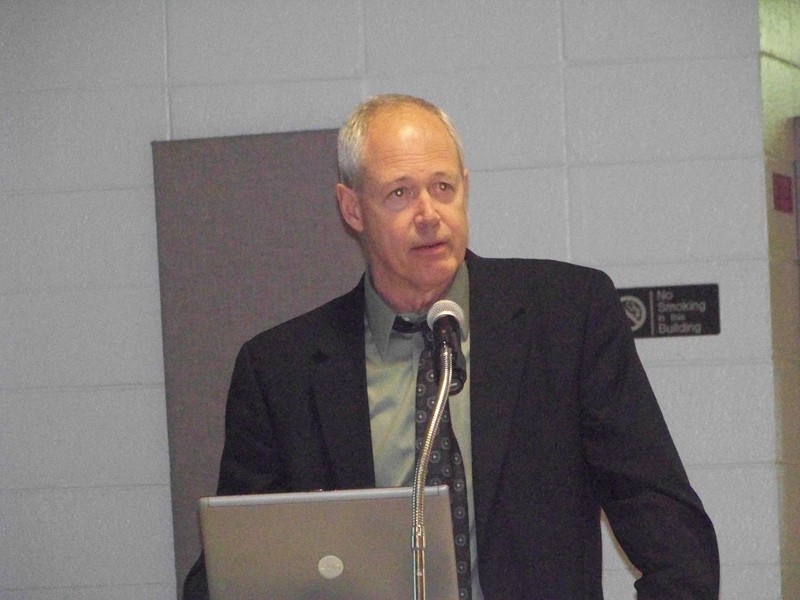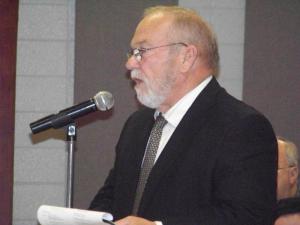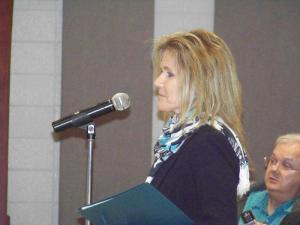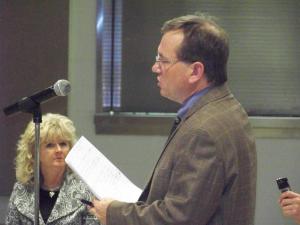Rehoboth Beach officials may have moved forward in choosing ocean outfall as their preferred wastewater discharge alternative, but members of the public want the city to reconsider land application.
Contained in a binder as thick as a cinder block was the city’s environmental impact statement, a massive document required for $25 million in state funding to build Rehoboth’s ocean outfall. The overall cost of the project, which includes the outfall and upgrades to the city’s wastewater treatment plant, is around $30 million.
The Department of Natural Resources and Environmental Control held a public hearing April 10 at the Rehoboth Beach Convention Center to gather public comment on the statement. All the comments must be addressed in the final statement.
Of the nearly 50 attendees, only six spoke.
The first speaker was the city’s engineer, Rip Copithorn of GHD, who summarized the city’s intentions for the project. The genesis of the project was a consent order that required the city to stop dumping its treated effluent into the Lewes-Rehoboth Canal by Dec. 31, 2014.
The city ultimately chose ocean outfall over land application because land application was not practical or cost effective, Copithorn said. While land application was a proven technology, he said, the city could not find the land needed or a practical solution, whether it be through buying the land or partnering with Sussex County or a private utility.
The plan for the ocean outfall is to pump treated effluent from the wastewater treatment plant through an underground pipe, which would be built using a combination of directional drilling and open trench cutting, to a discharge point 6,000 feet off Deauville Beach.
Copithorn said the discharge point was selected because it was where the most dilution was found.
Speakers favor land application
Within the environmental impact statement, one of the negatives is the public perception of ocean outfall. Copithorn tried to address these concerns, saying Rehoboth’s wastewater treatment plant already treats to well below the Department of Natural Resources and Environmental Control’s standards.
While Copithorn extolled the benefits of ocean outfall, the speakers who gave public comment were in favor of land application.
Gregg Rosner of Selbyville said the outfall was a denigration of the ocean, adding toxic chemicals, heavy metals and pharmaceuticals to the waterway. He said these chemicals ruin the environment for sea turtles, blue crabs and other animals that come to the surface to breathe or get food.
Suzanne Thurman, executive director of the Marine Education, Research and Rehabilitation Institute, said the data collected on the environmental impact on animals is outdated, with several endangered or threatened species within the area affected by the outfall. She said the statement also does not account for animals that are seasonal in the area, such as the harbor porpoise, which is here from March to May. However, the data collected was from the summer months, she said.
John Thaeder of Artesian Water Company, said municipalities along the East Coast, particularly in Florida, are trying to get out of ocean outfalls. He said the information on land application in the statement is dated. Thaeder suggested land application as the best solution, given its benefits to Sussex County farmers.
Thaeder said Artesian could modify the wastewater treatment plant to pump the treated effluent to a lagoon in the Coolspring area near Milton, where it would be land applied. He said the plan would cost $24 million, nearly $6 million less than the cost of ocean outfall.
“Sussex County has thousands of acres in agricultural use between Rehoboth and Georgetown that are commercially farmed,” Thaeder said after the hearing. “In fact, the area between Rehoboth and Milton, within a half mile of the proposed pipeline, has more than 4,000 acres of active farm land, and the flow from Rehoboth’s plant could help irrigate up to 2,000 acres of that land.”
Gary Warren, president of the Delaware Farm Bureau, said recycling water via land application does not just help farmers, but helps feed the world at a time when farmers are having to produce more food.
“To waste this water - we recycle plastics, we recycle metals, we recycle paper - and we need to do everything we can to recycle our water,” Warren said. “This wastewater also provides an economic benefit to farmers. It cuts back on energy costs, thus making agriculture more effective.”
He said the idea that there is not adequate land for land application is “a myth at best and it’s a lie at worst.”
Jack Musser said he believes ocean outfall is very shortsighted, and there must be a more practical solution to disposing of Rehoboth’s wastewater than dumping it in the ocean.
If built, Rehoboth’s outfall would be the fifth in the area, after South Coastal Wastewater Treatment Plant in South Bethany, and plants in Ocean City, Md., and Wildwood Seven Mile Beach in New Jersey.
After the meeting, Rehoboth Mayor Sam Cooper said of the public perception of ocean outfall, “Other than Rehoboth right now, from Cape Henlopen to Assateague, all the wastewater on the coast is discharged in the surface waters. It’s not a hindrance to tourism. The discharge we have is far cleaner than the other two [South Coastal and Ocean City] and it’s smaller. It truly is a drop in the bucket. People are entitled to say what they want to, but obviously, I think there’s a lot of misinformation.”
Copithorn said in talking to different tourist boards of towns that have ocean outfalls, those towns have said once the outfall is built, people don’t even know it's there, with no negative effects on tourism.
Public comment still accepted
Greg Pope of DNREC's financial assistance branch said once the comments are all addressed, the final statement would be prepared. The department will make its final decision approving or disapproving the project in July, Pope said.
To view the environmental impact statement, visit www.cityofrehoboth.com. Public comments are still being accepted until 4:30 p.m., Thursday, May 10. Comments can be sent in written form to: Greg Pope, Department of Natural Resources and Environmental Control, Financial Assistance Branch, 5 E. Reed St., Dover, DE 19901. Comments can also be faxed to 302-739-2137 or emailed to Rehoboth_EIS_Comments@state.de.us. Electronic submission is preferred.
Ryan Mavity covers Milton and the court system. He is married to Rachel Swick Mavity and has two kids, Alex and Jane. Ryan started with the Cape Gazette all the way back in February 2007, previously covering the City of Rehoboth Beach. A native of Easton, Md. and graduate of Towson University, Ryan enjoys watching the Baltimore Ravens, Washington Capitals and Baltimore Orioles in his spare time.





















































